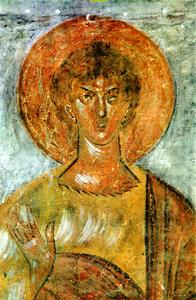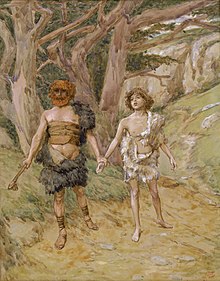Abel[a] is a Biblical figure in the Book of Genesis within Abrahamic religions. He was a younger brother of Cain, and the second son of Adam and Eve, the first couple in Biblical history.[1] He was a shepherd who offered his firstborn flock up to God as an offering. God accepted his offering but not his brother's. Cain then killed Abel out of jealousy.
Abel | |
|---|---|
 Icon of Abel by Theophanes the Greek | |
| Personal | |
| Born | 3897 (in Julian calendar) BC |
| Died | 3825 (in Julian calendar) BC |
| Parents | |
According to Genesis, this was the first murder and Abel was the first dead person in the history of mankind.
Life and death

The story of Cain's murder of Abel and its consequences is told in Genesis 4:1–18:[2]
[3] And Adam knew Eve his woman and she conceived and bore Cain, and she said, "I have got me a man with the Lord."[4] And she bore as well his brother Abel, and Abel became a herder of sheep while Cain was a tiller of the soil. And it happened in the course of time that Cain brought from the fruit of the soil an offering to the Lord. And Abel too had brought from the choice firstlings of his flock, and the Lord regarded Abel and his offering but did not regard Cain and his offering. And Cain was very incensed, and his face fell. And the Lord said to Cain,
"Why are you incensed,
and why is your face fallen?
For whether you offer well,
or whether you do not,
at the tent flap sin crouches
and for you is its longing,
but you will rule over it."[5] And Cain said to Abel his brother, "Let us go out to the field," and when they were in the field Cain rose against Abel his brother and killed him.[6] And the Lord said to Cain, "Where is Abel your brother? And he said, "I do not know: am I my brother's keeper?"[7] And He said, "What have you done? Listen! Your brother's blood cries out to me from the soil. And so, cursed shall you be by the soil that gaped with its mouth to take your brother's blood from your hand. If you till the soil, it will no longer give you strength. A restless wanderer shall you be on the earth." And Cain said to the Lord, "My punishment is too great to bear. Now that You have driven me this day from the soil I must hide from Your presence, I shall be a restless wanderer on the earth and whoever finds me will kill me." And the Lord said to him, "Therefore whoever kills Cain shall suffer sevenfold vengeance." And the Lord set a mark upon Cain so that whoever found him would not slay him.
And Cain went out from the Lord's presence and dwelled in the land of Nod east of Eden. And Cain knew his wife and she conceived and bore Enoch. Then he became the builder of a city and he called the name of the city like his son's name, Enoch.
— Book of Genesis, 4:1–18[8]
Interpretations
Jewish and Christian interpretations
According to the narrative in Genesis, Abel (Hebrew: הֶבֶל Hébel, in pausa הָבֶל Hā́ḇel; Biblical Greek: Ἅβελ Hábel; Arabic: هابيل, Hābēl) is Eve's second son. His name in Hebrew is composed of the same three consonants as a root meaning "the air that remains after you exhale" also synonymous in Hebrew to “nothing”, as stated in “ Ecclesiastes”. Julius Wellhausen has proposed that the name is independent of the root.[9] Eberhard Schrader had previously put forward the Akkadian (Old Assyrian dialect) ablu ("son") as a more likely etymology.[10]

In Christianity, comparisons are sometimes made between the death of Abel and that of Jesus, the former thus seen as being the first martyr. In Matthew 23:35 Jesus speaks of Abel as "righteous", and the Epistle to the Hebrews states that "The blood of sprinkling ... [speaks] better things than that of Abel" (Hebrews 12:24). The blood of Jesus is interpreted as bringing mercy; but that of Abel as demanding vengeance (hence the curse and mark).[11]
Abel is invoked in the litany for the dying in the Roman Catholic Church, and his sacrifice is mentioned in the Canon of the Mass along with those of Abraham and Melchizedek. The Alexandrian Rite commemorates him with a feast day on December 28.[12]
According to the Coptic Book of Adam and Eve (at 2:1–15), and the Syriac Cave of Treasures, Abel's body, after many days of mourning, was placed in the Cave of Treasures, before which Adam and Eve, and descendants, offered their prayers. In addition, the Sethite line of the Generations of Adam swear by Abel's blood to segregate themselves from the unrighteous.
In the Book of Enoch (22:7), regarded by most Christian and Jewish traditions as extra-biblical, the soul of Abel is described as having been appointed as the chief of martyrs, crying for vengeance, for the destruction of the seed of Cain. A similar view is later shown in the Testament of Abraham (A:13 / B:11), where Abel has been raised to the position as the judge of the souls.
In Bereshit Rabbah (22:2), a discussion of Gen. 4:1 ff. has Rabbi Yehoshua ben Korcha mentioning that Cain was born with a twin sister, and Abel with two twin sisters. This is based on the principle that the otherwise superfluous accusative article "et" always conveys some additional teaching (Pesachim 22b). The "et"'s are parsed slightly differently in Yebamot 62a where the two "et"'s in Gen. 4:2 indicate Cain and his sister, and Abel and his (one) sister.
Sethian Gnostic interpretation
In the Apocryphon of John, a work belonging to Sethian Gnosticism, Abel is the offspring of Yaldaboath and Eve, who is placed over the elements of water and earth as Elohim, but was only given his name as a form of deception.[13][14]
Mandaean interpretation
According to Mandaean beliefs and scriptures including the Qolastā, the Book of John and Genzā Rabbā, Abel is cognate with the angelic soteriological figure Hibil Ziwa,[15] (Classical Mandaic: ࡄࡉࡁࡉࡋ ࡆࡉࡅࡀ, sometimes translated "Splendid Hibel"),[16] who is spoken of as a son of Hayyi[17] or of Manda d-Hayyi,[18][19] and as a brother to Anush (Enosh) and to Sheetil (Seth),[20] who is the son of Adam.[21] Elsewhere, Anush is spoken of as the son of Sheetil, and Sheetil as the son of Hibil, where Hibil came to Adam and Eve as a young boy when they were still virgins, but was called their son.[22] Hibil is an important lightworld being (uthra) who conquered the World of Darkness.[18] As Yawar Hibil, he is one of multiple figures known as Yawar (Classical Mandaic: ࡉࡀࡅࡀࡓ, lit. 'Helper'), being so named by and after his father.[20]
Islamic interpretation


According to Shi'a Muslim belief, Abel ("Habeel") is buried in the Nabi Habeel Mosque, located on the west mountains of Damascus, near the Zabadani Valley, overlooking the villages of the Barada river (Wadi Barada), in Syria. Shi'a are frequent visitors of this mosque for ziyarat. The mosque was built by Ottoman Wali Ahmad Pasha in 1599.
In modern media
- Abel is portrayed by Franco Nero in the film The Bible: In the Beginning... (1966).
- Paul Rudd played the role of Abel in the 2009 film Year One.
- In the SCP series, an anomaly named Able with the codename SCP-076 is based on Abel.
- In Shin Megami Tensei: Devil Survivor, the main character Kazuya is the reincarnation of Abel